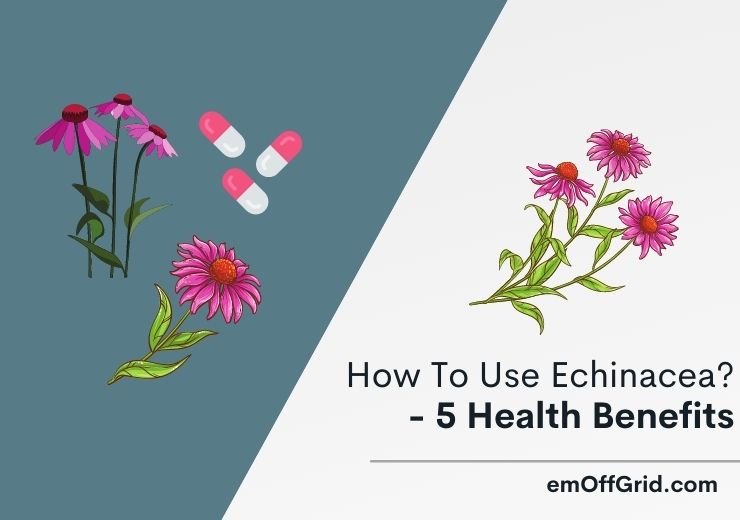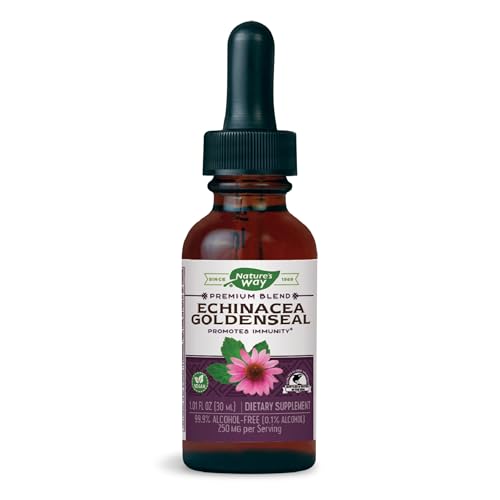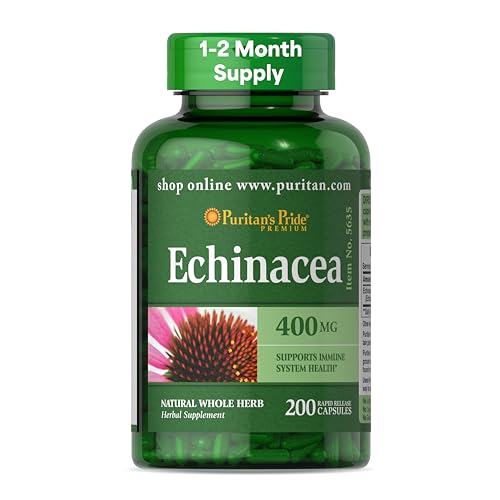Echinacea gained popularity many years ago as a medicinal herb. Lately, you might not find it at the grocery store because many people believe it is outdated.
That is not true, given how important this plant is to off-gridders and those practicing herbal medication.
Living off the grid can put you some miles away from the nearest health facility, meaning you need to know some home remedies to common health problems.
With the echinacea plant, you can fight colds, flu, respiratory infections, and bladder infections. It is an immune-boosting plant.
Echinacea is a perennial plant that you can plant in your garden for beauty. With its colorful cornflower, it can enhance the curb appeal of your garden.
If you are new to this medicinal plant, then keep reading. We will discuss the 5 important health benefits of echinacea.
Contents
What Are Echinacea?

Echinacea is a name used to refer to a group of flowering plants native to North America. The group is also known as coneflowers.
The individual plants in this group can be pink or purple and produce a seedhead similar to a sunflower. The only difference is that coneflowers are spiky.
They can also be brown or red, depending on the species.
Identification
As stated earlier, Echinacea is a group of perennial flowering plants that produce cone-shaped flowers with brown or red seedheads.
The flower petals can either be pink or purple, depending on the particular species.
The Echinacea purpurea is the most common variety, producing purple flower petals. However, you can find others with different colors such as yellow, orange, and white.
It is this property that makes Echinacea the best choice for most gardeners.
Being perennial plants, you can expect the colorful flowers of Echinacea to appear in your garden year after year.
Echinacea Profile
Echinacea grows in dry areas, commonly found in the North American tallgrass prairie.
This herbaceous plant grows to about one meter tall with deep woody taproots. They grow in the wild but can also perform well as a garden plant.
Echinacea has been used for medicinal purposes throughout human history. By 1997, this plant became one of the top-selling herbs in the United States.
When ingested in any form, Echinacea enhances the production of immunity-boosting white blood cells.
The three commonly used species in the pharmaceutical industry are E. Purpurea, E. Pallida, and E. Angustifolia. They can relieve the symptoms of cold and tons of other diseases, as we will see in later sections.
Preparations Of Echinacea
Echinacea is available in different forms as a medicinal herb in the market. The type you buy will determine how you use it to suppress the symptoms. Today, you might find them as:
- Fresh/Dried (Sometimes in Tea)
- Dietary Supplement (Pill Form)
- Preparation to Apply to the Skin
- Squeezed (Juice Form)
- Extract (Capsul Form)
For self-medication, you are likely to use Echinacea fresh or dried or squeezed to produce juice. Choose your preferred method to prepare a dose.
How To Use Echinacea

The way you will use this medicinal herb depends on the preparation. Its juice is best taken as a drink and dried one can be grounded and used as dietary supplements or mixed with jelly and applied on the skin.
That means there are two main ways to use it: mouth and skin.
Dosage and usage of Echinacea vary in adults and children. The challenge is the lack of standardization of echinacea preparations. Seek doctor’s advice if planning to administer any echinacea extract to a child.
Long-term use of any of the above echinacea preparations is not recommended. See a doctor if the conditions do not change after using them for 10 days.
You can use Echinacea preparations in the following cases:
- Coughs and Colds
- Bronchitis
- Upper Respiratory Infections
- Gingivitis
- Influenza
- Canker Sores
- Yeast Infections
- Ear Infections
- Vaginitis
- Some Inflammatory Conditions
- HIV
- Aids
- Help Wounds Heal
Taking Echinacea By Mouth
Possible Use Cases
The ingested echinacea preparations are effective in treating the common cold.
However, there is insufficient evidence to gauge the efficacy in curbing the symptoms of Anxiety, Gingivitis, Herpes simplex virus (HSV), Human papillomavirus (HPV), Influenza (flu), Low White Blood Cell Count (Leukopenia), Middle Ear Infection, Tonsillitis, etc.
Echinacea has proved effective in treating many diseases or at least reducing their effects on the body. Contact your doctor if you are not sure whether it will work in your case or not.
What is The Dosage?
The dosage depends on the echinacea preparation you are to use. There are no strict regulations or standardization when it comes to this topic. Use the following as the recommended dosage for adults:
- 300 Mg of Dry Powdered Extract Daily
- 900 Mg Tincture Orally Daily
- 6-9 Ml of Liquid Extract Daily
- 0.5 – One G Dried Root or Tea Daily
- 5-6 Cups Tea for the First Day. (Proceed to reducing this by one cup for five days.)
Nature’s Way Premium Formula Echinacea
- Promotes immunity.*
- Seven-herb blend of Echinacea purpurea extract, goldenseal root extract, Echinacea angustifolia extract, gentian root extract, burdock root extract, wood betony extract, and cayenne fruit extract.
- 99.9% alcohol free drops are convenient for on the go.
Note When Using
Stick to the recommended doses and do not use Echinacea if you have known hypersensitivity to plants belonging to the Asteraceae/Compositae family.
Take all the doses on time. Take any missed dose as soon as you can, however, never take two doses at a go.
Adverse reactions such as allergy and GI upset can result when used for a long time.
Applied To The Skin
Application of echinacea cream through the skin can cure psoriasis, eczema, wounds, pimples, etc.
What is the dosage?
You can apply the Echinacea cream preparation on the affected area of the skin twice a day. Stop the application if more rashes appear on the skin. Some users have reported this as one of the adverse effects of Echinacea extract.
5 Health Benefits Of Echinacea

Why is Echinacea valued for medications, and what are the health benefits it offers? Many off-gridders and herbalists prefer this herbaceous plant for the many health benefits it has, including, but not limited to the following:
Strengthens The Immune System
Echinacea is used for medicinal purposes because it boosts the human immune system. Your body can better fight disease-causing germs because of the increased number of white blood cells.
So, the extracts and preparations work by activating the body to produce more white blood cells.
Puritans Pride Echinacea 400 mg for Health to Support Immune System
- TRADITIONAL HERBAL IMMUNE SUPPORT: Echinacea, a centuries-old herb used by Native Americans, is traditionally used to support immune system health and promote overall wellness*
- NATURAL WHOLE HERB: Crafted with natural Echinacea, this supplement is free from artificial colors, flavors, and sweeteners*
- SUITABLE FOR VARIOUS DIETARY NEEDS: Contains no sugar, milk, lactose, soy, gluten, wheat, fish, or sodium, making it an excellent option for those with specific dietary restrictions or sensitivities*
Can Lower Blood Sugar
Echinacea is effective in lowering blood sugar levels by suppressing carbohydrate-digesting enzymes. The body gets sugar from the carbohydrate-rich foods we eat.
But with suppressed enzymes, less digestion of such foods takes place along the digestive tracts. That leads to less sugar in the blood.
Anti-Inflammatory Properties
Echinacea preparations can stimulate and signal immune responses. They can reduce inflammatory markers and memory loss resulting from inflammations.
That property makes Echinacea an excellent anti-inflammatory medicine for treating upper respiratory infections.
Anxiety Relief
Echinacea angustifoliae radix is a particular species that can reduce anxiety and tension. An extract from this plant can safely restore brain chemistry.
A substance in the root of this species binds with brain receptors to calm down the body.
Can Help Treat Skin Problems
Apart from the anti-inflammatory property of Echinacea, it also has antibacterial properties.
These two attributes give it the power to suppress the growth of Propionibacterium, which commonly causes acne.
Other skin diseases you can treat with Echinacea include psoriasis, eczema, wounds, pimples, etc.
7 Cases Where Echinacea Should Not Be Used

Echinacea can be used by many people to treat the diseases and conditions mentioned in this article. Unfortunately, this medication is not for everyone.
Individuals with some underlying conditions are not encouraged to use it. Avoid Echinacea-related treatments if you have the following:
Any Autoimmune Diseases
Echinacea is used in many different ways, including food supplements. Whichever the form, you should avoid it if you have autoimmune diseases.
That is because echinacea medications improve immunity, which can worsen such diseases as lupus. Speak to your doctor if you are unsure about it.
People Receiving Organ Transplants
You should not use any form of echinacea medication just before or after an organ transplant. Echinacea can improve your immunity, leading to acute organ rejections.
It can be fatal if the organ transplant had already been done. And how will you feel if your body turns out to reject an organ donated to you for a transplant?
People With Asthma And Allergies
Asthma and other allergies can be potentially triggered by Echinacea because it is a member of the daisy family. If you have such conditions, you are safer if you avoid any Echinacea-related medications.
Pregnant Or Breastfeeding Women
There is no reliable evidence on whether to use Echinacea when expecting or breastfeeding.
However, expectant women can safely use this medication during the first trimester without affecting the baby.
Due to insufficient information, breastfeeding mothers should just avoid it for safety.
Do Not Use With Immunosuppressive Medications
If you are under immunosuppressive medications, do not use Echinacea unless otherwise permitted by your doctor.
You should take precautions because Echinacea can notoriously improve your immune system. Having two drugs with opposite effects can lower the efficacy of both.
Some drugs that should not be used with Echinacea include Darunavir, Docetaxel, Etravirine, Lopinavir, Midazolam, etc.
Do Not Use With Caffeine
Caffeine is quickly absorbed into the bloodstream but is also quickly broken down by the system.
Using caffeine together with Echinacea can lead to caffeine accumulation in the blood to a dangerous level.
Some adverse effects of these conditions include jitteriness, headache, and a fast heartbeat.
Possible Side Effects When Using Echinacea
Echinacea medications are not all that safe. They can cause minor effects such as stomach upset, nausea, dizziness, among others.
In severe cases, Echinacea can trigger allergic and asthmatic reactions, rashes, swelling, and breathing difficulties.
You should see a doctor immediately if you feel anything unusual when using Echinacea medication. It is your quick action that can save you and stop further reactions.
Wrapping Up
Echinacea is an important group of plants in pharmaceuticals. This perennial herbaceous plant can effectively suppress the symptoms of many diseases.
You need to plant it in your garden as the first resort when dealing with coughs, colds, upper respiratory infections, etc.
However, you need to consult your doctor before using it if you have any underlying conditions or are under any medications. Its use can lower the efficacy of some drugs and might trigger allergies and asthma.
We thank you for taking the time you took to read our post on how to use Echinacea. At the Em Offgrid, we explore topics you need to live happily and healthily off the grid. You may check our other posts for related topics.


